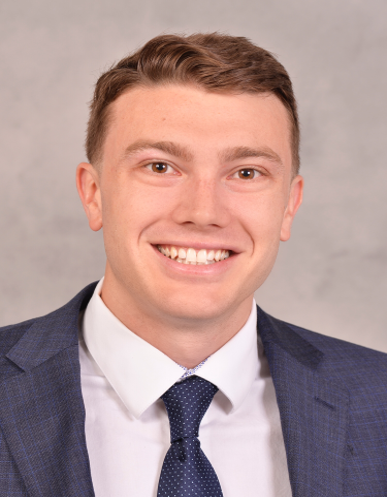
James Assif, MD
PGY-5
SUNY Upstate Medical University
James has a long record of commitment to academic endeavors, initially cultivated through his chemistry and biochemistry experiences at Connecticut College, and subsequent technology-driven basic science research during his gap year at Aerodyne Research, Inc. in Boston, MA. He has since transitioned his efforts to clinical outcomes research while completing his training at the University of Maryland. Outside of work, he finds passion in outdoor activities and his continued involvement in athletics after his collegiate track and field career, and spends much of his free time participating in multiple recreational soccer leagues in Baltimore. He is not only proud to be a resident of the University of Maryland Radiation Oncology team, but describes his experience with much gratitude.
Why University Maryland? James chose Maryland not only for the program's strength in training, but because of the family he gets to be a part of for his four years in training. He has made lasting relationships with his mentors, co-residents, and coworkers that aren’t found easily in a training program.
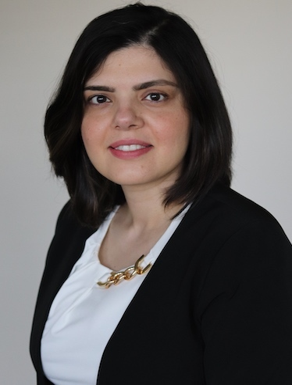
Soha Bazyar, MD
PGY-5
Mashhad University of Medical Sciences
Mother, wife, bioengineer, and radiation oncology resident, Soha lives them all together. Born and raised in Iran, she moved to the U.S. shortly after finishing medical school at the Mashhad University of Medical Sciences. Amazed by the innovative role of engineering in medicine, she applied for a PhD program in the department of bioengineering at the University of North Carolina at Chapel Hill. During her thesis project, she got to know the field of radiation oncology, and worked on its different aspects including physics and radiation biology. During her free time, she loves doing projects around the house. After theater, gym, and an outdoor playground, what will be her next project?
Why University Maryland? Soha enjoys going to work every day. She loves the culture and the community in the department. At Maryland, not only does she receive great training and research opportunities, but also the supportive environment of the department which enables her as a mom to have a great work-life balance.
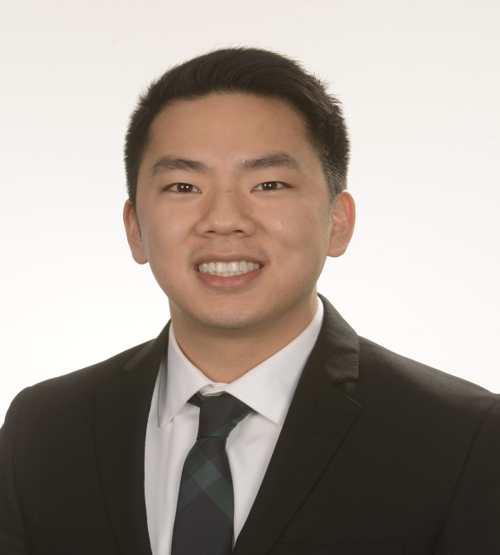
Hua-Ren Ryan Cherng, MD
PGY-5
University of Maryland School of Medicine
Ryan was, believe it or not, born at the hospital he currently works at, but grew up about 30 minutes away from Baltimore. He went to the University of Pennsylvania for college, then returned to the University of Maryland for his medical school training, and stayed on as a resident. In his free time, Ryan enjoys the outdoors, hiking, playing tennis, going to breweries/wineries, going to new museums, and traveling.
Why University Maryland? Ryan loves the comradery and collegiality of this residency and his co-residents, the commitment to education demonstrated by the faculty, and the breadth of training that this program offers.
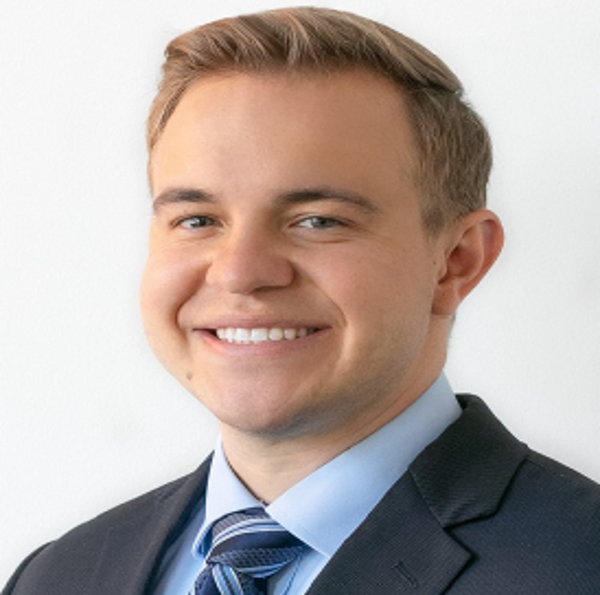
Alexander Allen, MD
PGY-4, co-chief resident
Virginia Commonwealth University School of Medicine
Alexander grew up in Virginia Beach, VA and attended Yale University as an undergraduate student, where he majored in molecular biology. He then received his MD from the Medical College of Virginia/Virginia Commonwealth University School of Medicine, followed by a transitional year internship at Riverside Regional Medical Center in Newport News, VA. His clinical and research interests include stereotactic radiosurgery and the treatment of oligometastatic disease, as well as treatment of the central nervous system, thoracic, and hematologic malignancies. In his spare time, he enjoys playing recreational soccer and basketball, fishing, drawing, painting, and cheering on the Ravens.
Why University of Maryland? When Alexander was applying to residency, Maryland had everything he was looking for in a program: excellent clinical training and volume, access to a variety of technologies including hyperthermia, Gamma Knife, on-site proton radiotherapy, robust clinical research with ample opportunities for resident involvement, and nationally renowned clinical and physics faculty. He remembered being blown away on his interview day after hearing about these features of the program, and also seeing how incredibly friendly and approachable all of the residents and attendings were. It also didn't hurt that he had been a Baltimore Ravens fan since childhood, and the stadium is a 4-minute drive from the hospital.
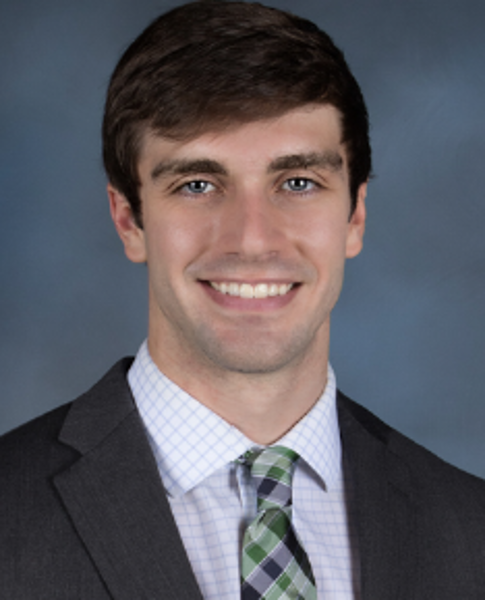
Matthew Brown, MD (he/him)
PGY-4, co-chief resident
University of Alabama School of Medicine
Matthew grew up in Huntsville, AL and spent most of his life there through medical school. He thoroughly enjoyed all his oncology rotations, and combined with his interests in the physical sciences, radiation oncology was an obvious choice for him. During his free time, he enjoys swimming, playing the piano, and exploring Baltimore as well as the surrounding areas.
Why University Maryland? Matthew was initially drawn to the University of Maryland by the wide range of cutting-edge technologies employed in the department, and eh was particularly impressed by both the clinical and research training benefits that came with that. He chose Maryland because the culture of the program stuck out to as being heavily education-focused, and his experiences here have only further confirmed that.
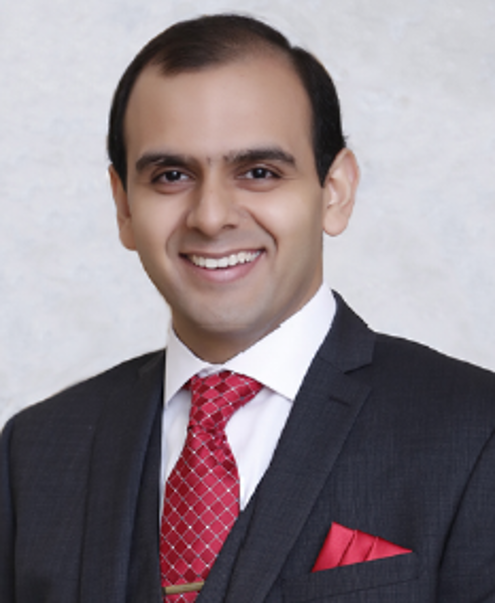
Muhammad Ali Hamza, MD
University of Maryland School of Medicine
Muhammad is a Baltimore native through and through. He attended Baltimore City Public Schools through high school, went to Johns Hopkins University for college, and completed medical school at the University of Maryland. He is interested in examining health care disparities related to cancer care, as well as the impact of cancer on mental health. In his free time, he likes to spend time with friends and family, read, and watch the Baltimore Ravens.
Why University of Maryland? One thing that attracted Muhammad to the residency program at the University of Maryland was the emphasis on advancing the field of radiation oncology through multidisciplinary research and innovation while still keeping patient care, compassion, and empathy at the forefront.
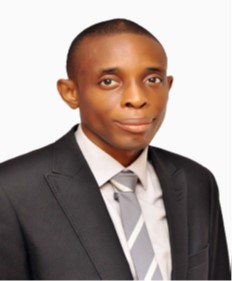
Adeniyi (Niyi) Olabumuyi, MBBS
PGY-3
University of Ibadan College of Medicine
Adeniyi, who goes by Niyi, completed his PGY-1 year at NYC Health + Hospitals/Woodhull in Brooklyn, New York. Before that he was an attending radiation oncologist at a premier teaching hospital in Nigeria. In his spare time, Niyi enjoys playing FIFA with his son and dancing.
Why University of Maryland? Our program was highly recommended to Niyi by one of his colleagues. He felt that our program has great faculty-to-resident relationships with diverse backgrounds, as well as faculty who are interested in the growth and well-being of the residents. His research interests include breast, prostate, and cervical cancers; molecular determinants and risk factors in oncology system/quality improvement; and global oncology.
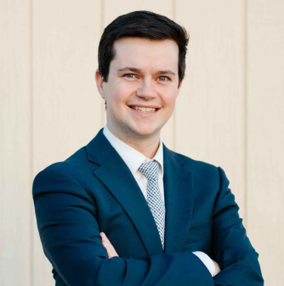
Austin Thompson, MD (he/him)
PGY-3
California Northstate University College of Medicine
Austin Thompson was born in Walnut Creek, California where he spent most of his youth, spending the majority of his time in Antioch, California. He went to school at Brigham Young University in Provo, Utah where he majored in neuroscience with a minor in gerontology. Austin attended medical school at California Northstate University College of Medicine and completed his transitional year at St. Joseph's Medical Center in Stockton, California. Austin enjoys playing board games, baking, and cooking cuisines from all parts of the world. Recently he has also enjoyed golfing, hiking, and playing pickleball.
Why University of Maryland? Austin chose UMMC because it is a top-tier academic institution with state-of-the-art technology in radiation oncology. He feels that he will receive good mentorship here from leaders in the field as well as a robust and varied education in the various modalities offered in radiation oncology, and that he will be an adept clinician when he graduates. His interests include therapeutic radiation treatments for benign conditions, such as low-dose radiation therapy for osteoarthritis. He is also interested in investigating disparities in access to care and how to bridge those gaps in conjunction with improving patient outcomes.
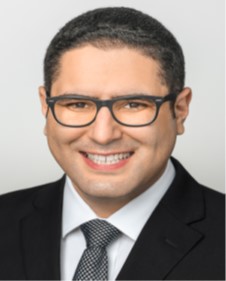
Reza Zarinshenas, MD
PGY-3
University of Wisconsin School of Medicine and Public Health
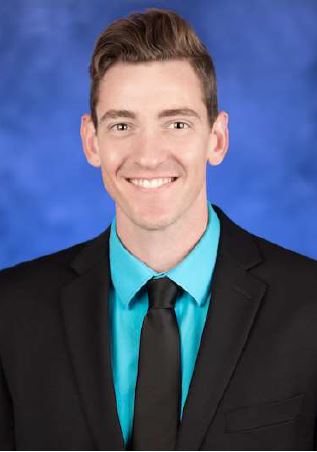
Travis Hoover, MD
PGY-2
Penn State College of Medicine
Travis is a born-and-bred Pennsylvanian. His undergraduate degree was completed at Messiah University, followed by Penn State (Hershey) for medical school. Travis took a year out during medical school to complete a student fellowship in pathology at the University of Pennsylvania. He then completed a transitional year at Lehigh Valley Hospital. Outside of medicine, Travis enjoys staying active with volleyball, basketball, mountain biking, rock climbing, skiing, and disc golf. He also loves to travel, and has been to all 50 states and over 20 countries.
Why University of Maryland? Travis feels thrilled to be at the University of Maryland for his radiation oncology residency, and truly cannot imagine a better program for himself. He anticipates vigorous training in all facets of the field, along with the extensive research opportunities. Travis looks forward to working with people who view their colleagues as a sort of "family", and he finds Baltimore to be a beautiful city. Travis plans to focus much of his research on the intersection between radiation oncology and pathology. He also has an interest in research related to equity, specifically examining the Baltimore community’s access to radiation therapy and how it might be improved.

Yomna Khamis, MD, MSc
PGY-2
Alexandria University in Alexandria, Egypt
Yomna graduated from Alexandria University in Egypt. She completed her journey through medical school and residency specializing in clinical oncology, where she trained in both medical and radiation oncology. Yomna completed her preliminary year in the transitional program at Beaumont Hospital Royal Oak in Michigan. This experience provided her with a broader perspective and a diverse set of skills. In her spare time she has a fondness for discovering new places, immersing herself in nature, delving into history, and writing children’s stories.
Why University of Maryland? Science and technology are ever-evolving fields, with new discoveries and advancements made daily. Yomna considers herself an eager learner, especially when the knowledge gained can lead to change and improvement. Her passion lies in radiation oncology, a field she believes to hold immense potential for patient care. Yomna's research interest lies in radiotherapy for head and neck conditions, with a specific focus on reducing toxicity.
Beginning July 1, 2025
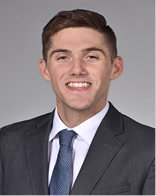
Paul Armstrong
University of Virginia School of Medicine
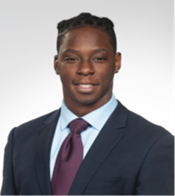
Olufela (Felly) Jean-Koleoso
Philadelphia College of Osteopathic Medicine
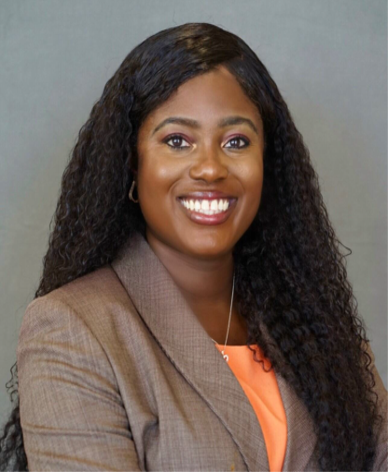
Anita Nwiloh
Meharry Medical College
Faculty Program Directors
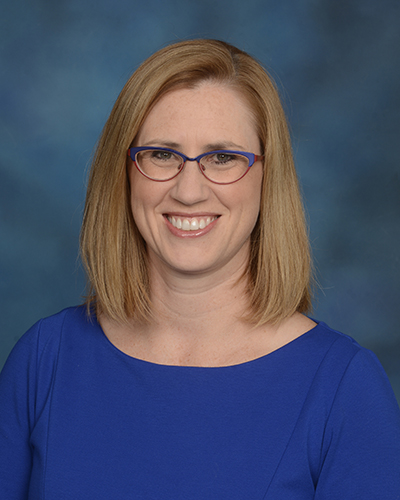
Sarah Anne McAvoy, MD (she/her)
Associate Professor
Vice Chair for Education
Residency Program Director
Department of Radiation Oncology
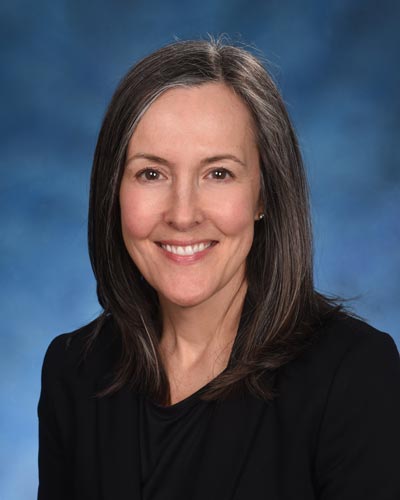
Wendla (Wendy) K. Citron, MD (she/her)
Assistant Professor
Residency Program Associate Director
Medical Director, Tate Cancer Center - UM BWMC
Department of Radiation Oncology
Resident Workroom at UMMC
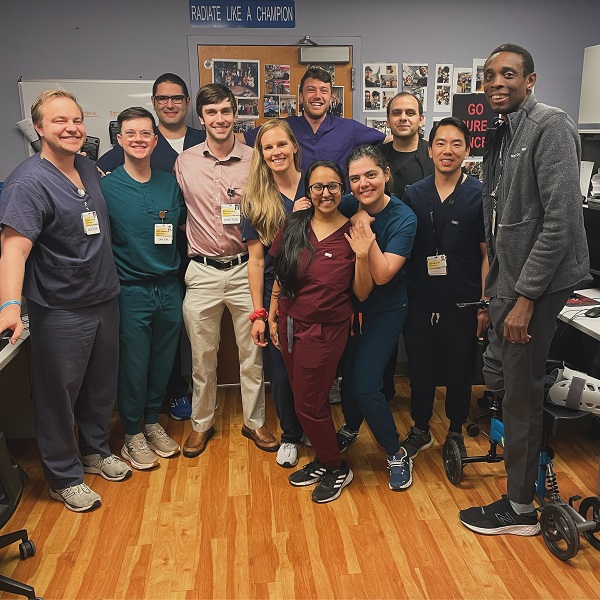
Dr. Karl L. Prado Endowment for Radiation Oncology Trainees
Help Fund the Next Generation of Cancer Treatment Specialists
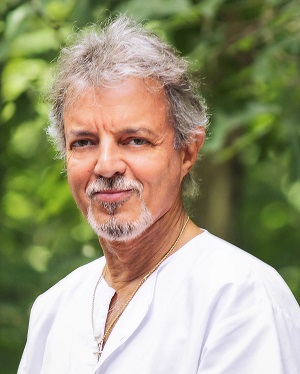
Karl L. Prado, PhD, FACR, FAAPM
1950–2018
Dr. Karl L. Prado served as a faculty member and invaluable medical physics educator to trainees and staff from 2009 to 2017 at the University of Maryland Department of Radiation Oncology. In 2019, the department renamed the Dr. Karl Prado Physics and Radiobiology Review Course to honor the memory of Dr. Karl Prado and recognize his unmatched teaching abilities.
The Dr. Prado endowment helps support our educational mission by funding trainees, medical and physics residents, fellows, radiation therapists, dosimetrists, nurses, and medical students for a number of initiatives including attendance at research conferences, educational events, training, wellness activities, and elective rotations.
Your support of the Dr. Karl L. Prado Endowment for Radiation Oncology captures your dedication to all facets of training and continuing education which enables our trainees to help save lives through their work.
Give to the Dr. Karl L. Prado Endowment for Radiation Oncology Trainees

